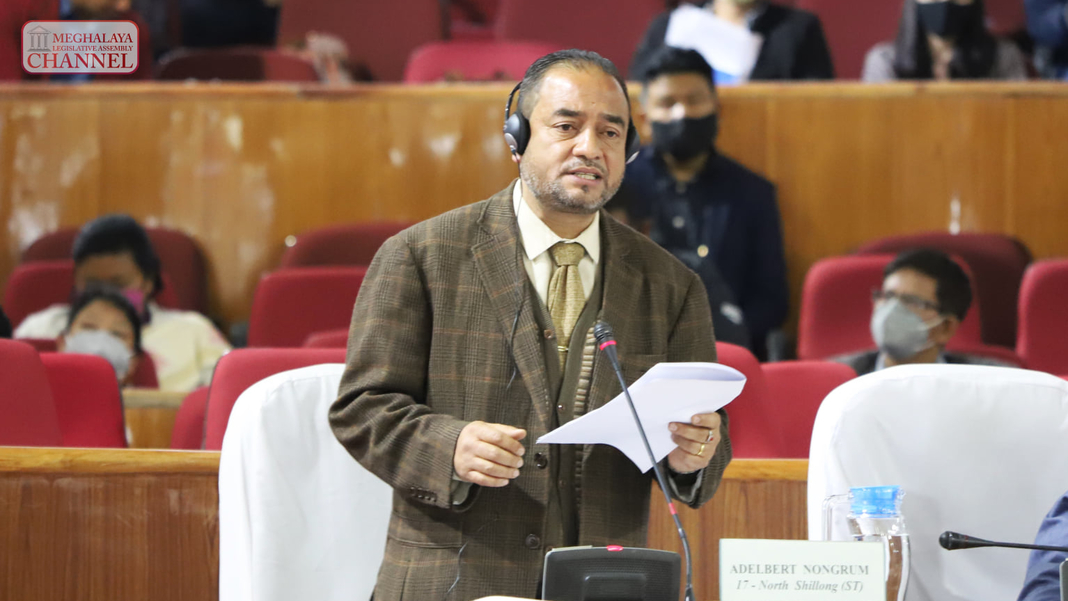Shillong, Mar 10: Khun Hynniewtrep National Awakening Movement (KHNAM) legislator from North Shillong Adelbert Nongrum on Thursday reiterated his demand for review and revamp of the “outdated” state reservation policy.
Moving a resolution in the Assembly, Nongrum said, “It is high time that the government resolution on reservation of vacancies in services/posts be reviewed and revamped.”
Urging the legislators from both the treasury and opposition benches to support the resolution, the MLA said, “I humbly make an appeal to weigh without prejudice the anomalies of the government resolution and give a conscience vote that this house resolves to review and revamp the outdated reservation policy.”
He said the reservation of vacancies in services/posts under the state government is essentially embodied in what is said to be a government resolution appearing in the office memorandum (OM) issued by the Personnel department of the government on January 12, 1972 and amended on April 20, the same year.
He said it is said to be a government resolution because that is how subsequent OMs of the Personnel department issued in the years 1972, 1974 and 1979 have described the primary OM, while making additions to the reservation orders.
Nongrum said that OMs are understood to be administrative instructions, and in absence of statutory rules made by the government, they are held to have the validity of law. This is provided in Article 73 (2) of the Constitution, and upheld in judgments by courts of law.
“We therefore get to know that the said OMs will continue to hold force till such time that a properly drafted law is passed by the state legislature, if at all, either to endorse the existing reservation policy or to change it,” he said.
He further stated that the framers of the resolution on reservation surely must have relied on official statistical data on population to arrive at the ratio of 40 percent for Garo community and 40 for Khasi-Jaintia communities
As per the Census of India 1971 and the demographics relating to Meghalaya showed a total state population of 10,11,699 persons, of which Schedule Tribe population was 82.8 percent. Garo were 3.24,197 persons and Khasi-Jaintia were 4,56,674 persons, he said.
“Based on these figures and considering only the three major tribal communities of the state, Garo constituted 41.5 percent and Khasi-Jaintia 58.5 percent – clearly the government resolution of 40:40 appears to have favoured one community over the combined other two, when the ratio should have been 33.2 percent and 46.8 percent respectively,” Nongrum said adding that the anomaly should have been rectified.
As per 2001 census, the population of Meghalaya was 23,18,822 persons, of which Schedule Tribe population was 85.9 percent. Garo were 6,89,639 persons and Khasi-Jaintia 11,23,490 persons.
Synteng was listed both as a sub-tribe under Khasi-Jaintia as well as a separate tirbe and enumerated at 18,342 persons.
“Going by the same computation done earlier, Garo constituted 37.7 percent and Khasi-Jaintia, with the inclusion of Synteng, constituted 62.3 percent.We see that the population of Khasi-Jaintia shot up significantly and if the reservation policy was to have been updated as per revised census,” he said.
The MLA further alleged as per the OM issued on May 28, 1874, candidates from areas outside Meghalaya, who are well conversant in Garo language, are eligible to avail reservation in state government jobs in a category earmarked specifically for Garo people.
“Isn’t this another anomaly? I mean, why should citizens of neighbouring state and country, even though they may be of Garo community, be allowed reservation in our state?” he asked.
Stating that reservation of seats in state quota to higher academic courses does not come at all under the ambit of the reservation orders of the OM of January 12, 1972 or subsequent OMs issued by the Personnel department, Nongrum said what has been practice by the health department, the veterinary department and the Directorate of Higher and Technical education for nomination of candidates to seats against state quota by allotment of categories in accordance with state reservation policy is a “blind interpretation” and a “misconstruction of law”.
He said this is because an administrative instruction of the Personnel department is limited in effect only to persons employed in or seeking employment to state government service and it absolutely cannot apply mutatis mutandis to students pursuing higher education.
“Students are not government employees, and the administrative instruction is ultra vires,” the MLA said..
“Now why academic reservation was conveniently linked with state reservation policy? Why are outsiders being allowed reservation in state government jobs against Garo category? And why are demographics from census not being used to derive a suitable ratio between Garo and Khasi-Jaintia category for reservation in state government jobs? These 3 questions I shall leave for the government of the day to answer,” he said.






